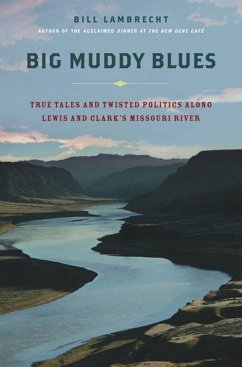America's Missouri River may be the nation's longest and most historically significant river, encompassing many of America's natural wonders between Missouri and Montana, draining almost 600,000 square miles in ten states and part of Canada, and, after Lewis and Clark's expedition 200 years ago, opening the West to a frenzied rush of expansion.
But the Missouri is also the site of a vast, politically driven drama. It tops a list of emerging big-stakes river wars around the country that pit conservation, development, farm, barge, American Indian, and government interests against one another in clashes made even more complicated by the scarcity of water in many river basin states.
In Big Muddy Blues, veteran journalist Bill Lambrecht uses the bicentennial of Lewis and Clark's epic adventure west as a lens to show the other side of the story: what's been lost over 200 years. And the losses, on top of the 120 miles cut off the river by Army Corps stabilization efforts, aren't slight. Dependent on every word uttered in courtrooms and legislatures for their futures are more than 80 rare and endangered species, the family farms that require a stabilized river, the barges of shippers that require a heavier flow, and dozens if not hundreds of sacred Native American burial grounds.
Running through it all is the water--more than 2,300 miles of it--that slakes the thirst of people in one-sixth of the nation and has, in the last few hundred years, been home to Native Americans, explorers, and settlers; river pirates, shipwrecks, and steamboats; and farmers, conservationists, and the Army. This is the story of "Big Muddy," of its influence on the formation and stability of our nation and of its place in the center of an escalating river war that will set the stage for water wars in the decades to come.
But the Missouri is also the site of a vast, politically driven drama. It tops a list of emerging big-stakes river wars around the country that pit conservation, development, farm, barge, American Indian, and government interests against one another in clashes made even more complicated by the scarcity of water in many river basin states.
In Big Muddy Blues, veteran journalist Bill Lambrecht uses the bicentennial of Lewis and Clark's epic adventure west as a lens to show the other side of the story: what's been lost over 200 years. And the losses, on top of the 120 miles cut off the river by Army Corps stabilization efforts, aren't slight. Dependent on every word uttered in courtrooms and legislatures for their futures are more than 80 rare and endangered species, the family farms that require a stabilized river, the barges of shippers that require a heavier flow, and dozens if not hundreds of sacred Native American burial grounds.
Running through it all is the water--more than 2,300 miles of it--that slakes the thirst of people in one-sixth of the nation and has, in the last few hundred years, been home to Native Americans, explorers, and settlers; river pirates, shipwrecks, and steamboats; and farmers, conservationists, and the Army. This is the story of "Big Muddy," of its influence on the formation and stability of our nation and of its place in the center of an escalating river war that will set the stage for water wars in the decades to come.
Dieser Download kann aus rechtlichen Gründen nur mit Rechnungsadresse in D ausgeliefert werden.









